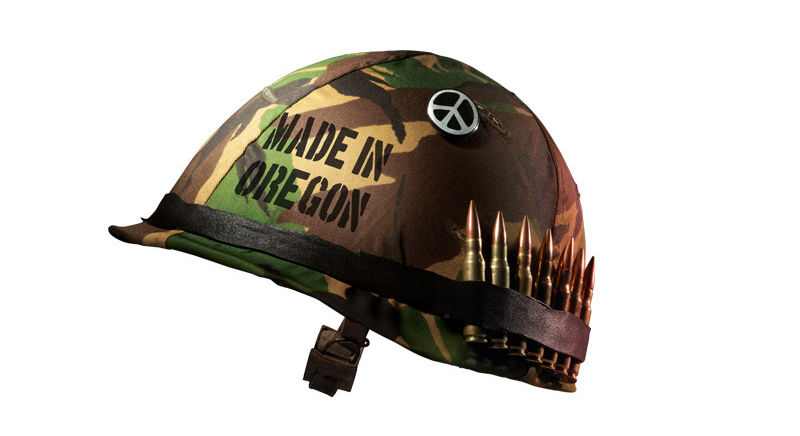Portland’s Thriving Defense Industry

Image: Jesse Champlin
FOR MORE THAN 60 YEARS, Leupold and Stevens Inc has produced some of the world’s best rifle scopes. Founded in Portland a century ago and now based in Beaverton, Leupold has been the primary supplier of the US Army’s sniper scopes since the mid-’80s. In May of this year the company’s new tactical division sold 728 machine-gun scopes to the US Marine Corps, under a contract worth about $3 million.
While Leupold makes 80 percent of its money selling to civilians, military business lends the firm pride and cachet. “There are more Leupold long-range tactical optics on the ground with US forces than any other brand,” says Kevin Trepa, a company vice president. “Performance in the field drives the consumer market.”
Ten years ago this month, the US invaded Afghanistan. A decade of fighting, there and in Iraq, has killed about 130 Oregon service members. Recently, Portland’s Sam Adams joined the US Conference of Mayors to decry the campaigns’ economic toll—the group’s first declaration on military policy since Vietnam.
Over the same decade, however, Portland has developed an under-the-radar but rapidly expanding military-industrial complex. War is hell, as they say, but it’s big business, too—and, even in the city once dubbed “Little Beirut” for the ferocity of its opposition to the first Iraq war, a small sliver of the Pentagon pie can feed profound, unpredictable change.
Oregon has always been a minor player in the lucrative defense procurement sweepstakes. But between 2006 and 2009, the total value of the state’s defense contracts shot from $570 million to $1.6 billion. (For perspective, Virginia, with its welter of Pentagon spin-offs, soaked up about $50 billion in ’09.) Portland-area companies grab the bulk of the money, raking in more than $1 billion in 2009.
That cash is catalyzing an increasingly potent new business cluster. In 2005, the Pacific Northwest Defense Coalition formed to turn a disparate collection of companies into a unified advocacy force to attract more military dollars. The region-wide PNDC’s Portland roster encompasses familiar local industries like outdoor gear, athletic apparel, optics, and technology, as well as medical suppliers and a growing cadre of hangers-on—law firms, banks, and staffing agencies, among others—hunting defense contracts in otherwise lean times.
Brice Barrett, the PNDC’s executive ?director, notes that defense spending nearly doubled nationally after the 9/11 terror ?attacks. But he believes Portland’s emergent industry will thrive even as the federal government cuts spending. “We’ll probably hold onto those dollars in the future,” he says, “because the PNDC has helped our companies become better contractors.”
The PNDC’s most prominent names belong to enterprises, like Leupold, that serve both soliders and civilians. The Wilsonville thermal-imaging company Flir, possibly the state’s biggest defense contractor, landed a navy contract worth $52 million in August, but also recently launched a night-vision camera designed for hunters and hikers. Danner Boots markets itself to outdoorsmen, laborers, and craft-loving hipsters, but in 2010 sold $8.6 million worth of mountain combat boots for soldiers in Afghanistan.
Portland’s defense business also ?includes some more exotic efforts. A small ?supplier called Astico Defense Solutions has landed a few minor government contracts but lives a much more exciting dual life on the web as Sexyweapon.com, selling surplus tactical gear and accessories (including T-shirts that read “Live Free and Don’t Die”). The company’s founder, 31-year-old West Point grad and Iraq veteran Justin Jangraw, says Sexy Weapon’s customer base includes law enforcement as well as civilians with a yen for military hardware.
But the field’s most intriguing developments happen beyond well-known names like Danner (and search-engine magnets like Sexy Weapon), in the realm of innovations with peacetime potential.
Portland medical supplier HemCon has received more than $40 million in defense grants and contracts since 2004. The company makes a wound dressing made of chitosan, a biodegradable material fabricated from shrimp exoskeleton, which it helped develop. According to army research, HemCon bandages have a near-100-percent success rate in stopping blood flow when properly applied. Blood loss is a leading cause of trauma deaths, and the Portland-made bandages are rapidly finding their way into first-responder kits, ambulances, emergency rooms, and dentists’ offices.
The PNDC’s Barrett is confident that today’s military millions will lead to other local advances, and more civilian jobs tomorrow. “You’ll see innovations that will be around long after we’re out of Iraq and Afghanistan,” he says.
After World War II, Army Signal Corps veteran Howard Vollum adapted military radio advances and cofounded Tektronix, sowing the first seeds of the Silicon Forest. That watershed moment for Portland’s economy and culture stands as a reminder that the human folly of war transforms the society it leaves behind. While we may be far removed from battle, we shape war and war shapes us.



